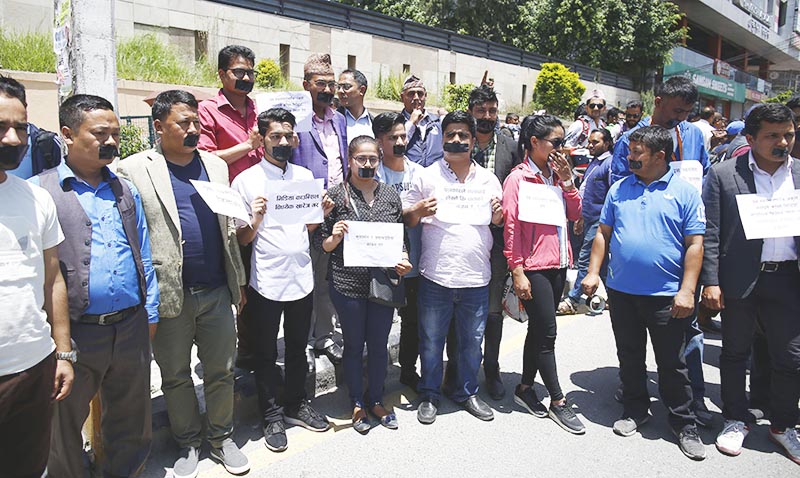Journalists continue protests across country
Kathmandu, May 17
Journalists today demonstrated across the country demanding withdrawal of the Media Council Bill, which they said would curtail press freedom.
Led by the Federation of Nepali Journalists and backed by rights activists and civil society, journalists staged a sit-in in front of the Parliament in New Baneshwor and in front of District Administration Offices across all 77 district headquarters.
In Kathmandu, FNJ President Govinda Acharya, FNJ office bearers, journalists and rights activists took part in the protests. The protesters held placards with slogans such as ‘journalism is not a crime’, ‘scrap the Media Council Bill’, ‘ensure
good governance and accountability’, ‘journalists write news, not glorify those in power’, and ‘hail press freedom’. They covered their mouths with black bands to symbolically protest the bill that tries to curtail freedom of expression.
Opposition parties, including the Nepali Congress and Rastriya Janata Party-Nepal, and Nepal Media Society have already expressed solidarity with the journalists’ agitation, stating that passage of the bill in its existing form would lead the country towards authoritarianism.
The FNJ, which has been agitating for the past week, decided to intensify its agitation after the government turned deaf ears to its demand for withdrawal of the bill from the Parliament and its revision in consultation with all stakeholders.
The bill related to the constitution of the Media Council has proposed a fine up to Rs 1 million on media outlets, editors, publishers and journalists if they are found guilty of damaging someone’s reputation.
Section 18 (1) of the new bill stipulates that if any media publish content in contravention of the code of conduct and if an investigation launched after the affected party complains, finds that such news content damaged the reputation of the complainant, then the council can impose a fine between Rs 25,000 and Rs 1 million on media outlets, publishers, editors, journalists and reporters.
Section 18, Sub-section (2) of the bill stipulates that the council can order the erring parties to pay a compensation if the content in the media outlet damages the reputation of the affected party.
Section 17 proposes punishment for violating the code of conduct, which includes suspending press pass of mediapersons and downgrading the classification of print media outlets.
The bill also proposes a committee under a government secretary to make recommendations to the chairperson of Nepal Media Council, which the FNJ says will relegate Nepal Media Council to a branch of the Ministry of Communications and Information Technology.
FNJ President Acharya said even a week after agitation was launched and even though almost all media outlets were raising the issue consistently, statements coming from the government were indifferent towards their demand, prompting them to intensify their protests.
Prime Minister KP Sharma Oli, at a press conference on Wednesday upon arrival from his foreign visit, had said the government had not introduced the bill haphazardly. He said the provisions were put in place envisioning a civilised society where civilised discussions could take place.
“The Parliament will discuss and endorse the bills following due process. So let’s not defame democracy by overtaking the Parliament. This is an elected government. It will discuss the issue in the Parliament, and reach a conclusion,” he had said.
FNJ President Acharya said they would convene a meeting of the central committee tomorrow to decide on further protest programmes as the government’s indifference had continued.






